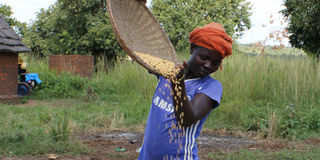Farmers decry low prices of soya beans

One of the farmers at Pagirinya Village in Dzaipi Sub-county prepares to dry some of the soya beans that she harvested in Adjumani district on Sunday. PHOTO/MARKO TAIBOT
What you need to know:
The farmers are storing their crops in anticipation of higher prices in the coming months
Hundreds of farmers in Adjumani District have hoarded tonnes of soya beans, citing low market prices.
More than 200 groups and individual farmers growing soya beans say they are stuck with close to 50 tonnes of soya beans.
The farmers embarked on soya bean planting under the Development Initiative in Northern Uganda (DINU) pilot project. The 26 million euro (about Shs101 billion) project run from 2017 to 2022 in 33 districts, focused on nutrition and food security, road infrastructure, and good governance.
The project, funded by the European Union, among others, promoted the growing of oilseed crops including soya beans in the region for commercial purposes.
In Adjumani, the project targeted farmers in Dzaipi, Pakele, Adropi, Itirikwa, and Ukusijoni sub-counties.
Mr Hawadi Drasiga, a farmer in Dzaipi Sub-county, who had 46 acres of soya beans, at the weekend said he is stuck with over 70 sacks of soya beans due to low prices.
“I bought the seedlings at Shs5, 000 per kilogramme, and yet middlemen want to buy a kilogramme at only Shs2, 000. I will not recover my costs because I spent close to Shs10 million on land opening, labour and other expenses. It is a big loss because I had planned to sell the soya beans to pay school fees and meet other family needs,” he said.
Mr Drasiga said several buyers have approached him to sell a kilogramme between Shs1, 800 to Shs2, 000 which he said is a loss.
“We want to start a cooperative so that we can have big bargaining power, but unfortunately, we have different capacities. Some of the farmers are impatient and they cannot wait longer, so we call upon the government to help us in marketing the crop,’’ he said.
Another farmer, Mr Michael Amoko from Pakele Sub-county, said he is hoarding 21 sacks of soya beans.
“I am still keeping the soya beans inside. But if a buyer wants a kilogramme at Shs3,000, I can sell because I only want to recover the costs incurred,” Amoko added, ‘’Last year I planted 17 acres, and I wanted to increase the acreages but with this price, I am not sure if I will do that this year.”
Mr James Logwenya, the agriculture officer of Dzaipi Sub-county, said farmers are hoarding soya beans due to high costs of production. He however said those desperate for quick cash are selling their soya beans at less than Shs2,000 per kilogramme.
The Ofua Sub-county chairman, Mr Robert Dramwi, said there are about 30 farmer groups in the area who participated in the DINU project.
“Ofua has become a hub of Soya beans, the farmers have been trained on seed planting, quality seed identification and post-harvest handling. We have more than 10 tonnes but our farmers cannot sell them due to low prices. Unfortunately, some of the farmers took loans in order to enable them to grow on a large scale,” Mr Dramwi said.
He has urged farmers to form cooperatives to improve their bargaining power.
“When the farmers are not organised into cooperatives, middlemen tend to take advantage and buy at low prices” he added.
Genesis of price drop
The prices of soya beans have been dropping in recent years due to their low demand on the world market, hence affecting the small-scale farmers.
For instance in 2019, a kilogramme of soya beans dropped from Shs1, 500 to Shs1,000. From 2020 to date, the prices have been averaging at Shs2, 000.
Farmers said MAKSOY3N and MAKSOY 4N varieties are the most demanded for varieties in Northern Uganda. They said the two varieties mature in less than 120 days and are more resistant to pests and drought.




